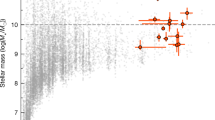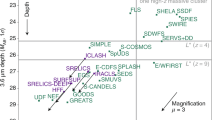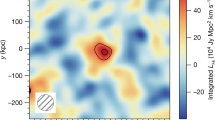Abstract
IT has recently been suggested1 that the quasi-stellar radio sources are objects that have been ejected by relatively nearby peculiar galaxies. If their large red-shifts are due to the Doppler effect, we shall show that one would, in fact, expect to see many more objects with spectral shifts towards the blue than those with shifts towards the red.
This is a preview of subscription content, access via your institution
Access options
Subscribe to this journal
Receive 51 print issues and online access
$199.00 per year
only $3.90 per issue
Buy this article
- Purchase on Springer Link
- Instant access to full article PDF
Prices may be subject to local taxes which are calculated during checkout
Similar content being viewed by others
References
Arp, H. C., Science, 151, 1214 (1966).
Leighton, R. B., Principles of Modern Physics, 14 (McGraw-Hill, New York, 1959).
Trautman, A., Pirani, F. A. E., and Bondi, H., Lectures on General Relativity, 336 (Prentice-Hall, New York, 1964).
Kellermann, K., Astrophys. J., 140, 969 (1964); Oke, J. B. (to be published).
Schmidt, M., Astrophys. J., 141, 1295 (1965).
Author information
Authors and Affiliations
Rights and permissions
About this article
Cite this article
FAULKNER, J., GUNN, J. & PETERSON, B. Expected Number of Blue-shifts and Red-shifts of Ejected Sources. Nature 211, 502–503 (1966). https://doi.org/10.1038/211502a0
Issue Date:
DOI: https://doi.org/10.1038/211502a0
This article is cited by
Comments
By submitting a comment you agree to abide by our Terms and Community Guidelines. If you find something abusive or that does not comply with our terms or guidelines please flag it as inappropriate.



